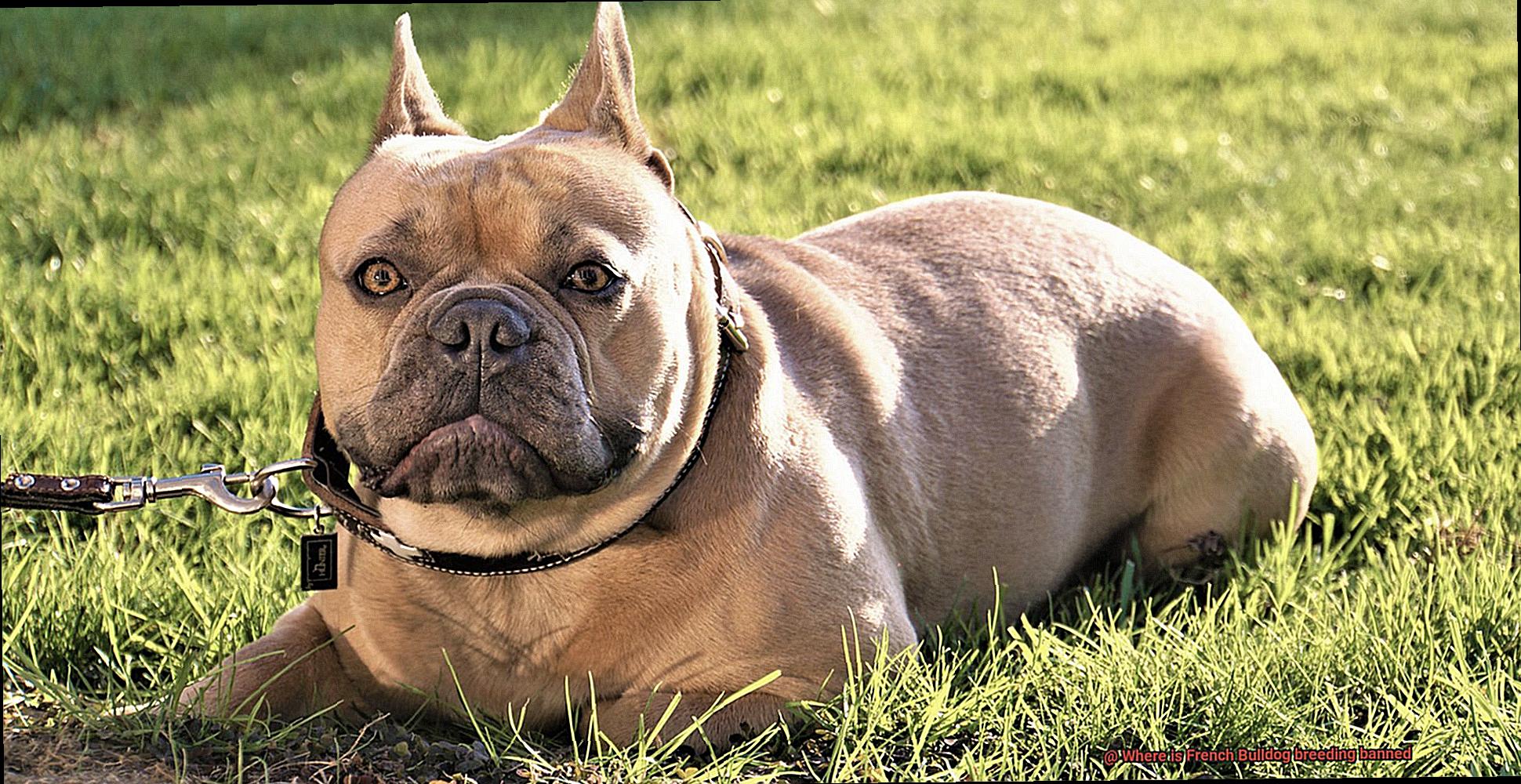Where is French Bulldog breeding banned?
Today, we’re diving headfirst into the wild world of French Bulldog breeding and uncovering some surprising places where this adorable breed is strictly off-limits. French Bulldogs have stolen hearts all over the globe with their squishy faces and lovable personalities. But hold onto your leashes, because concerns about their health and well-being have led to some serious restrictions in certain countries and municipalities. Get ready to join us on this thrilling adventure as we unveil the unexpected spots that have put a muzzle on French Bulldog breeding.
French Bulldogs, or “Frenchies” as they’re affectionately called, are in high demand worldwide. Their compact size, playful nature, and those cute bat-like ears make them an instant hit with families and even famous folks. However, a surge in health problems within the breed has sparked heated debates about how they’re bred and cared for.
To tackle these concerns head-on, some countries and regions have taken bold steps to control French Bulldog breeding. They’ve rolled up their sleeves and put regulations in place that aim to give these adorable pups healthier and happier lives.
Now, hold onto your chew toys because we’re about to reveal some jaw-dropping places where French Bulldog breeding is a big no-no. From quirky cultural differences to ethical considerations, the reasons behind these bans are as diverse as the spots themselves.
So, whether you’re a die-hard Frenchie fan or just curious about where animal rights meet the law, this deep dive into French Bulldog breeding bans will open your eyes wider than a pup who’s just spotted a squirrel.
Join us on this captivating journey as we explore why these bans exist, how they impact the future of the breed, and why they’ve become rallying points for dog welfare everywhere. Let’s wag our tails together as we embark on this intriguing adventure. Stay tuned for some eye-opening insights that will leave you begging for more.
The Netherlands: Banning French Bulldog Breeding
Contents
- 1 The Netherlands: Banning French Bulldog Breeding
- 2 Norway: Regulations for French Bulldog Breeding
- 3 United Kingdom: Voluntary Guidelines for French Bulldog Breeding
- 4 Belgium: City Bans on French Bulldog Breeding
- 5 Australia: Restrictions on French Bulldog Breeding
- 5.1 Health Tests: Prioritizing Your Frenchie’s Well-Being
- 5.2 Clearing Hereditary Health Issues: The Key to Responsible Breeding
- 5.3 Limits on Litters: Preventing Overbreeding
- 5.4 State Regulations: Checking Your Local Requirements
- 5.5 Importation Regulations: Protecting Local Dogs
- 5.6 A Call for Awareness: The Welfare of French Bulldogs
- 6 Responsible Ownership vs Irresponsible Breeding Practices
- 7 Health and Welfare Concerns of the Breed
- 8 Conclusion
If you’re considering adding a furry friend to your family, it’s crucial to stay informed about the latest developments in the world of French Bulldog breeding. In this blog post, we’ll be diving into the recent ban on French Bulldog breeding in the Netherlands and exploring the reasons behind this decision. So, grab a cup of coffee, settle in, and let’s get started.
Why the Dutch government has chosen to ban French Bulldog breeding:
The Dutch government has taken a firm stance against French Bulldog breeding due to serious concerns about the breed’s health and welfare. In 2014, strict regulations were introduced to address the rising popularity of brachycephalic breeds, including French Bulldogs, which led to irresponsible breeding practices and an increase in health issues.
One of the main reasons behind this ban is the respiratory problems that French Bulldogs commonly face. Their adorable short snouts make it difficult for them to breathe properly, causing respiratory distress and related health issues. Additionally, these lovable canines are prone to other health problems such as skin infections, eye conditions, and joint issues, which can lead to significant pain and suffering.
Reactions to the ban:
The ban on French Bulldog breeding in the Netherlands has sparked mixed reactions. Some people argue that it infringes on their rights as dog owners, while others support the government’s decision to prioritize animal welfare over breed popularity. It’s important to remember that this ban primarily targets irresponsible breeding practices rather than individual dog owners’ rights. The Dutch government aims to prevent further suffering among these breeds and promote responsible ownership of healthier alternatives.
Moving forward:
While there are still French Bulldogs in the Netherlands, their numbers are expected to decrease over time as breeding becomes more restricted. The Dutch government encourages potential dog owners to consider adopting from shelters or choosing a breed that is not prone to the health issues associated with French Bulldogs.
Norway: Regulations for French Bulldog Breeding

French Bulldogs are known for their adorable appearance and friendly temperament. However, these lovable dogs are also prone to a range of health issues, including respiratory problems and genetic abnormalities. In Norway, the government has implemented strict regulations to ensure the welfare of French Bulldogs and prevent irresponsible breeding practices. Let’s take a closer look at these regulations and how they benefit the breed.
- Licensing Requirements: Before breeding French Bulldogs or any other dog breed, breeders in Norway must obtain a license from the Norwegian Kennel Club (NKK). This license ensures that breeders meet certain criteria, including having a suitable breeding environment and demonstrating knowledge about responsible breeding practices.
- Regular Inspections: French Bulldog breeders in Norway are subject to regular inspections by NKK representatives. These inspections assess factors such as living conditions, health care, and socialization opportunities for the dogs. By conducting these inspections, the NKK ensures that breeders continue to meet the required standards and maintain the well-being of their dogs.
- Prohibition of Breeding Dogs with Health Issues: The NKK has set strict guidelines regarding the breeding of French Bulldogs with known health problems. Breeders must ensure that both male and female dogs used for breeding are free from genetic conditions such as breathing difficulties, hip dysplasia, or eye disorders.
- Importation Restrictions: Norway prohibits the importation of dogs for breeding purposes unless they come from countries with similar animal welfare regulations. This measure aims to prevent the importation of dogs from countries where irresponsible breeding practices are prevalent or where the welfare of dogs is not adequately protected.
- Documentation Requirements: Breeders in Norway must keep detailed records of each French Bulldog’s pedigree, health screenings, vaccinations, and other relevant information. This documentation helps track the lineage of French Bulldogs and ensures transparency in breeding practices.
These regulations in Norway aim to promote responsible breeding practices and protect the welfare of French Bulldogs. By implementing strict licensing requirements, conducting regular inspections, prohibiting breeding of dogs with health issues, and restricting imports, Norway ensures that French Bulldogs are bred in a healthy and responsible manner. These measures help prevent the proliferation of genetic disorders and other health issues commonly associated with the breed, ensuring that French Bulldogs in Norway are healthy and happy companions.
United Kingdom: Voluntary Guidelines for French Bulldog Breeding

French Bulldogs have become increasingly popular as companion animals, but their unique characteristics and genetic predispositions require careful breeding practices to ensure their health and welfare. In the United Kingdom, voluntary guidelines have been implemented to address these concerns and promote responsible breeding. Let’s delve into why these guidelines are crucial for the well-being of French Bulldogs.
Responsible Breeding Practices:
- Health Screening: Breeders are encouraged to conduct health tests on their dogs before breeding to identify any hereditary health conditions. This helps reduce the risk of passing on these issues to future generations.
- Avoiding Exaggerated Features: The guidelines discourage breeding for extreme features, such as excessively short muzzles, which can lead to breathing difficulties. Prioritizing health over aesthetics ensures that French Bulldogs can breathe comfortably and enjoy an active life.
Addressing Specific Health Issues:
- Brachycephalic Airway Syndrome (BAS): French Bulldogs are prone to BAS due to their short muzzles and flat faces. The guidelines emphasize the importance of selecting breeding dogs with healthier airways, reducing the prevalence of this condition.
- Spinal Problems: Intervertebral disc disease is common in French Bulldogs, and breeders are encouraged to consider the genetic history of spinal issues when selecting dogs for breeding.
- Eye Diseases: Regular eye examinations are recommended to identify hereditary eye diseases early on and prevent them from being passed on to offspring.
Responsible Puppy Rearing and Socialization:
- Suitable Environment: Breeders are urged to provide a nurturing environment for puppies, including proper nutrition, veterinary care, and a clean living space.
- Early Socialization: Puppies should be exposed to various stimuli during their critical socialization period, ensuring they grow up to be well-adjusted individuals with good temperaments.
Breed-Specific Health Testing Program:
Kennel Club Requirements: The Kennel Club has implemented a breed-specific health testing program for French Bulldogs, which mandates certain health tests before dogs can be registered. This program helps ensure that breeding dogs are free from common hereditary conditions.
Belgium: City Bans on French Bulldog Breeding
French Bulldogs have long been a beloved breed around the world, known for their affectionate nature and unique physical characteristics. However, in recent years, concerns about the health and welfare of French Bulldogs have led to city bans on breeding in Belgium. Let’s take a closer look at these bans and the mixed reactions they have received from the public.
The Bans in Belgium: A Response to Health Concerns
In Belgium, several cities, including Brussels, Antwerp, and Ghent, have implemented bans on French Bulldog breeding. These bans were put into place due to growing concerns about the health and well-being of these dogs. The popularity of French Bulldogs has led to an increase in irresponsible breeding practices, which in turn has contributed to a rise in health issues among these dogs.
One of the key health issues associated with French Bulldogs is brachycephalic respiratory syndrome. This condition affects dogs with short snouts, like French Bulldogs, and can cause breathing difficulties and other related health problems. The bans on French Bulldog breeding aim to address this specific issue and protect the overall health of the breed.
Mixed Reactions from the Public
The city bans on French Bulldog breeding in Belgium have received mixed reactions from the public. On one hand, there are those who support these bans as a necessary step to ensure the health and welfare of these dogs. They argue that irresponsible breeding practices have led to an increase in genetic disorders and other health issues among French Bulldogs.
On the other hand, some dog owners argue that these bans infringe on their rights as dog owners. They believe that responsible breeders should be allowed to continue breeding French Bulldogs while adhering to strict guidelines that prioritize health over aesthetics. They also argue that banning breeding altogether may lead to an increase in illegal breeding operations or an influx of poorly bred dogs from other countries.
What French Bulldog Owners Should Know
For French Bulldog owners in Belgium, it is important to be aware of these bans and understand the reasoning behind them. While some may see these bans as an inconvenience or restriction, it is crucial to prioritize the health and well-being of these dogs. Consider adopting from reputable breeders or rescue organizations that prioritize the breed’s health and welfare.
Conclusion
The city bans on French Bulldog breeding in Belgium reflect growing concerns about the health and welfare of these dogs. While the bans have received mixed reactions from the public, it is important for French Bulldog owners to prioritize their pet’s health and consider alternative options like adoption. By supporting responsible breeding practices, we can ensure a brighter future for these lovable companions.
Australia: Restrictions on French Bulldog Breeding
If you’re a proud owner of a French Bulldog in Australia, it’s essential to understand the regulations and restrictions in place for their breeding. While there are no nationwide bans on French Bulldog breeding, there are specific guidelines and standards that responsible breeders must adhere to. Let’s dive into the details to ensure the health and welfare of these adorable companions.
The Australian National Kennel Council (ANKC): Keeping French Bulldog Breeding in Check
The ANKC is the governing body for dog breeds in Australia, including French Bulldogs. They have established a code of ethics that breeders must follow, placing utmost importance on the health and well-being of these lovable dogs.
Health Tests: Prioritizing Your Frenchie’s Well-Being
French Bulldogs are known for their brachycephalic (short-nosed) anatomy, which can lead to various health issues. To mitigate these risks, the ANKC requires breeders to conduct health tests on their French Bulldogs before breeding them. These tests typically evaluate hip dysplasia, patellar luxation, and genetic diseases prevalent in the breed.
Clearing Hereditary Health Issues: The Key to Responsible Breeding
Before breeding, both the male and female French Bulldogs must be cleared of any hereditary health issues. Breeders obtain health certifications from veterinary professionals to ensure that only healthy dogs contribute to the gene pool.
Limits on Litters: Preventing Overbreeding
To prevent overbreeding and ensure proper care for each dog, the ANKC places restrictions on the number of litters a breeder can produce from a single dog. This ensures that every Frenchie receives adequate attention and care.
State Regulations: Checking Your Local Requirements
While there are no nationwide bans, individual states and territories may have their own regulations. For instance, in Victoria, breeders must register with the local council and comply with specific breeding requirements. It’s crucial to be aware of your state’s guidelines to ensure you’re following the law.
Importation Regulations: Protecting Local Dogs
The Australian government has strict regulations for importing dogs, including French Bulldogs. These regulations aim to prevent the introduction of diseases and health risks to the local dog population. Ensuring your Frenchie meets the necessary health and vaccination standards is essential if you’re considering importing one.
A Call for Awareness: The Welfare of French Bulldogs
In recent years, concerns about the welfare of French Bulldogs and other brachycephalic breeds have grown in Australia. Animal welfare organizations and veterinary professionals advocate for stricter regulations and better education to prevent breeding and ownership of dogs with severe health issues. It’s crucial for potential owners to research thoroughly and find reputable breeders who prioritize their dogs’ health and well-being.
Making Informed Decisions: Responsible Ownership
Responsible Ownership vs Irresponsible Breeding Practices
On the other hand, irresponsible breeding practices can lead to various health problems and negatively impact the breed as a whole. In this article, we will explore the key differences between these two approaches and provide valuable insights to help you make informed decisions as a French Bulldog owner.
Responsible Ownership:

Health Testing:
Responsible breeders prioritize the health of their dogs by conducting thorough health tests. This ensures that breeding dogs are free from common genetic disorders such as hip dysplasia, brachycephalic syndrome, and patellar luxation.
Conformation and Temperament:
Responsible breeders carefully select breeding dogs that conform to breed standards in terms of appearance and temperament. This ensures that puppies inherit desirable traits and maintain the breed’s integrity.
Proper Care and Socialization:
Responsible owners provide proper nutrition, regular veterinary care, exercise, mental stimulation, and socialization for their French Bulldogs. This contributes to their overall well-being and helps prevent behavioral issues.
Irresponsible Breeding Practices:
Overbreeding:
Irresponsible breeders prioritize profit over the welfare of their dogs, leading to overbreeding. This can result in poor health outcomes for both the dam and the puppies.
Inbreeding:

Irresponsible breeders may engage in excessive inbreeding to produce specific traits or phenotypes without considering the potential health risks associated with genetic abnormalities.
Puppy Mills and Backyard Breeders:
Irresponsible breeders often operate puppy mills or engage in backyard breeding practices where dogs are kept in deplorable conditions with little regard for their health and welfare.
Regulations and Restrictions:
To combat irresponsible breeding practices, several countries and regions have implemented regulations and restrictions on French Bulldog breeding.
- France: The French government has implemented strict regulations to ensure responsible breeding practices, including health testing and genetic diversity requirements.
- United Kingdom: The Kennel Club has imposed breed-specific restrictions on French Bulldogs due to their susceptibility to health issues. Breeders must adhere to specific guidelines, including health testing and limiting the number of litters a dam can produce.
- United States: Some cities and states, like Los Angeles, have implemented regulations requiring breeders to obtain permits and comply with health testing requirements.
Health and Welfare Concerns of the Breed
French Bulldogs are undeniably adorable with their wrinkly faces and bat-like ears. However, behind their charming appearance lies a breed that is prone to several health and welfare concerns. Let’s take a closer look at some of these issues and how they can affect these lovable companions.
- Brachycephalic Syndrome: The French Bulldog’s distinctive flat face and pushed-in snout contribute to a condition known as brachycephalic syndrome. This condition can cause difficulty breathing, overheating, and exercise intolerance. It’s crucial for owners to understand that French Bulldogs may struggle to breathe properly due to their limited airway space and increased effort required to get enough oxygen.
- Heat Stroke: French Bulldogs have a hard time regulating their body temperature, making them more susceptible to heat stroke. Their short noses make it difficult for them to cool down efficiently, especially in hot and humid climates. Owners must be vigilant and provide their French Bulldogs with plenty of shade, fresh water, and avoid exposing them to extreme temperatures.
- Allergies: Just like humans, French Bulldogs can develop allergies, both environmental and food-related. These allergies can manifest as skin irritations, itchiness, and recurrent ear infections. Regular grooming and proper diet management can help alleviate these issues, but it’s essential for owners to recognize the signs of allergies and seek veterinary advice when necessary.
- Joint Problems: Due to their compact size and stocky build, French Bulldogs are prone to joint problems such as hip dysplasia and patellar luxation. These conditions can cause pain, lameness, and difficulty walking. To minimize the risk of joint issues, owners should provide appropriate exercise and maintain a healthy weight for their French Bulldogs.
- Eye Problems: French Bulldogs are also predisposed to various eye conditions, including cherry eye (prolapse of the third eyelid gland), corneal ulcers, cataracts, and dry eye. Regular eye examinations by a veterinarian are crucial to detect and treat these conditions early on.
- Obesity: French Bulldogs have a passion for food, which can lead to obesity if not carefully managed. Being overweight puts additional strain on their compromised respiratory system and joints. Owners should monitor their French Bulldog’s diet and ensure they receive the right amount of exercise to maintain a healthy weight.
It’s important to note that not all French Bulldogs will experience these health concerns, but being aware of them can help owners provide the necessary care and attention to keep their furry friends happy and healthy. Regular veterinary check-ups, proper nutrition, exercise, and a safe environment are key to ensuring the well-being of this beloved breed.
cMnxelBjWDU” >
Conclusion
In conclusion, French Bulldog breeding is banned in several countries around the world.
These countries include Belgium, Denmark, Iceland, Norway, and the Netherlands. These bans have been put in place to protect the welfare of these beloved dogs.
By prohibiting their breeding, these countries are taking a stand against the unethical practices that often accompany French Bulldog breeding, such as overbreeding and inbreeding. This ensures that French Bulldogs are not subjected to unnecessary suffering and health issues caused by genetic defects.
The decision to ban French Bulldog breeding is a step towards promoting responsible pet ownership and safeguarding the well-being of these adorable companions.




